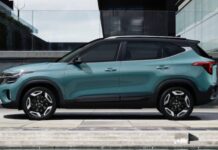As competition continues in the infotainment space, General Motors intends to remove Apple CarPlay functionality from its electric cars in the future.
General Motors will remove Apple CarPlay functionality from its electric cars, starting with the Chevrolet Blazer 2024 electric car that will arrive this fall.
Apple CarPlay, which works like Android Auto to display iPhone content on the infotainment screen, has been a consumer favorite for years, and even Japanese companies like Toyota have recently added the technology to their cars.
Integration with Apple CarPlay isn’t necessarily critical to the success of electric cars – Tesla is the simplest example – but the reason the feature was removed, according to GM, is to expand the cars’ capabilities.
General Motors has announced plans to remove Apple CarPlay from new electric cars, as its cars need better integration between the navigation system and a fast-growing network of charging stations to help electric vehicle drivers.
General Motors has been developing its own integrated self-driving system in cooperation with Google since 2019.
“Mike Heshmy, GM’s Executive Director of Digital Cockpit Experience, told Reuters: “We’ve got lots of new driver assistance features that are closely connected to navigation. We don’t want our design of these features to be reliant on the driver having a smartphone.”
Note that Hashemi didn’t mention anything about GM continuing to offer Apple CarPlay as an option for electric vehicle drivers, while the company offers its own advanced integrated navigation system focused on electric vehicles.
Music and phone calls should continue to work via Bluetooth in General Motors cars that don’t have CarPlay, and the company said CarPlay will continue to be available in its ICE cars.
And General Motors has announced that it will stop building internal combustion cars after 2035. The company said it would not disable Apple CarPlay technology in cars that currently contain it.
Initial reactions to GM’s decision have been decidedly negative online. Consumer data proves that it will be difficult for automakers to choose between offering features and keeping consumer data.
In March, Auto Pacific released data from its own study, which found that potential buyers of electric and plug-in hybrid vehicles are the most willing to pay for subscriptions to connected features.
Auto Pacific’s research also found that new car buyers rank Apple CarPlay and Android Auto as the second most desirable features in an infotainment system and connected technology.
Another reason people are unhappy is that General Motors has dropped one of its most admired features.
When you emulate your smartphone (which Apple CarPlay and Android Auto do), some of your data is deleted by the car, leaving GM out of the data loop when it comes to knowing your habits or schedule.
With an integrated system, GM will have easier ways to generate revenue through the various connected subscription services it can offer, such as targeted advertising and more accurate customer analytics.
But of course, this must be implemented in a way that respects users’ privacy and fully protects their personal data.



